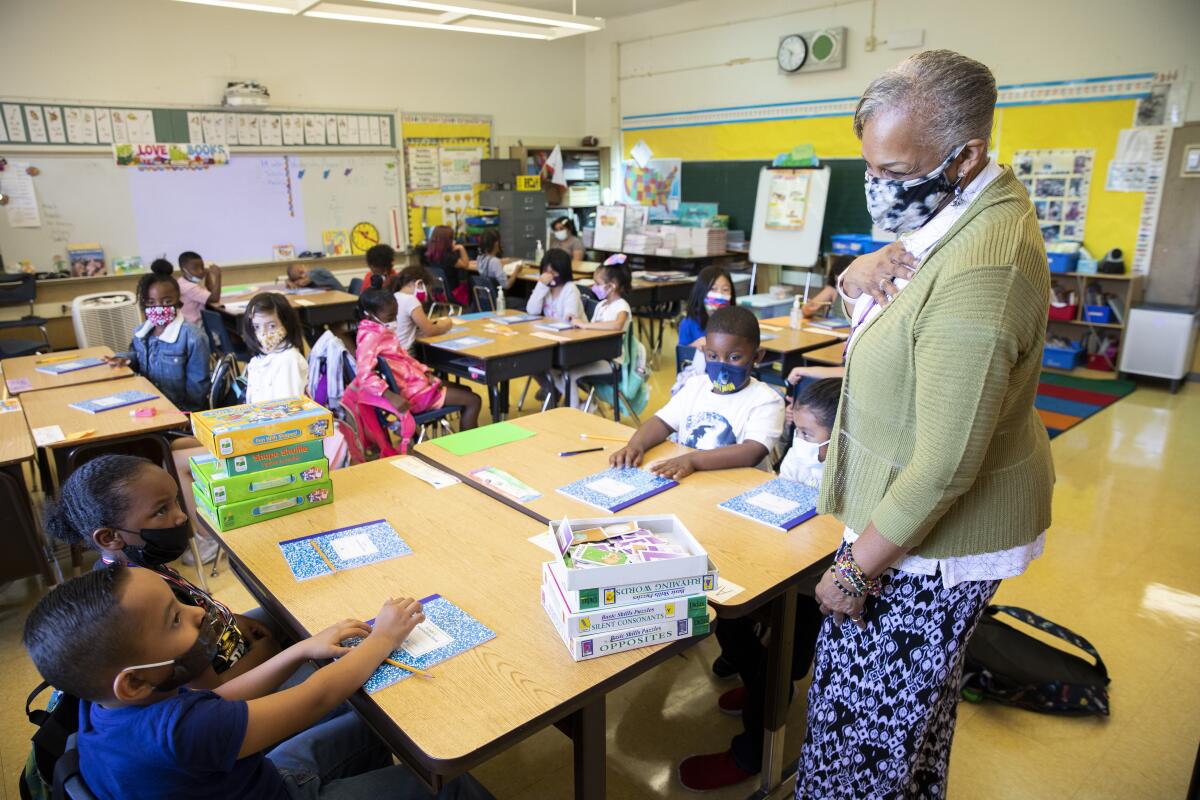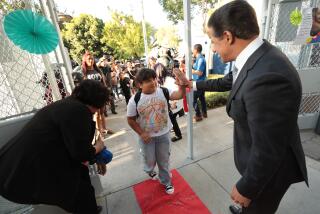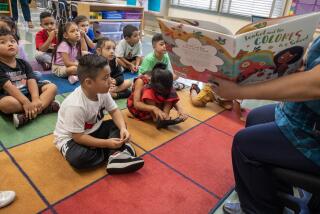Confidence in California public schools declines sharply; a third give L.A. a D or F

- Share via
Confidence in California public schools has declined as voters and parents overwhelmingly have concluded that the quality of education worsened during the pandemic, according to a UC Berkeley Institute of Governmental Studies poll co-sponsored by the Los Angeles Times.
Pollsters asked voters to give schools a letter-grade rating from A to F — essentially the same question asked of voters in a 2011 USC Dornsife/Los Angeles Times poll. A decade ago, the results were interpreted as sobering; the numbers are worse now.
Statewide, about 21% of voters give the state’s public schools an A or B; in 2011 it was 27%. Meanwhile, D or F grades statewide rose 15 percentage points in the last decade, from 13% to 28%.
In the city of Los Angeles, 18% of voters give schools an A or B; about 1 in 3 voters give D or F marks to public schools. Comparable figures are not available for 2011.
“The decline is significant,” Mark DiCamillo, director of the IGS poll, who has surveyed voters in California for more than four decades. “It could be a long-term trend, but I would certainly think that the impact of COVID has probably contributed to it.”
As in 2011, voters still give their local schools higher marks on average than they give to schools statewide, but the gap has shrunk. Statewide, 35% of voters give an A or B to “the public schools attended by children who live in your neighborhood.”
The percentage in Los Angeles was 24%. Improving both the perception and reality of L.A schools is part of the agenda laid out in a “100-Day Plan” unveiled Thursday by new L.A. schools Supt. Alberto Carvalho.
The poll was administered online to 8,937 registered voters statewide in English and Spanish from Feb. 3 to Feb. 10. Funding for the poll was provided in part by The Times.
The poll shows no major political shift in attitudes toward teachers unions. Voters remain widely divided, especially along partisan lines, with Republicans and conservatives far more critical.
Overall, pluralities — but not majorities — agree that unions are too powerful, resist reforms that would improve schools and are too focused on the needs of teachers rather than the needs of students. But a larger plurality — 46% — agrees that unions “strive to help teachers succeed in a very tough profession.” And opinions are almost evenly divided, within the margin of error, on the question of whether unions work to improve schools.
And, depending on the statement, about 20% to 30% stated they had no opinion at all — suggesting the issue was not so central to their personal political calculations.
On other school-related issues, the poll found:
- Solid support for free universal pre-kindergarten, even at significant cost to the state budget. By 67% to 25%, voters said they backed the plan to phase in the program for 4-year-olds by 2025.
- A close divide on the value of standardized testing, with 47% of voters saying that tests hurt public education, while 42% said they provide a benefit. On this question, a strong generational split emerged. The older the voters, the more likely they were to approve of standardized tests.
- In Los Angeles, where the issue of keeping or eliminating school police has been contentious, the poll found 41% favored having armed and uniformed police to patrol schools, while 34% preferred unarmed security personnel and 10% chose having no security personnel, with 15% having no opinion. Parents supported having police or other security personnel at a higher rate: 49% favoring armed police; 29% unarmed security and 7% neither.
On the decline in voters’ assessment of school quality, a big unknown is whether the shift from 10 years ago represents a long-term trend or a short-term reaction to the pandemic.
The pandemic clearly has played a role: 72% of voters said the quality of education has gotten worse “since the outbreak of the coronavirus,” including 40% who said much worse. With some variation, this assessment cut across all demographics. Among parents, for example, 67% said education had gotten worse.
“We had a lot of deficiencies beforehand, but now I feel that, with the excuse of the pandemic, everything has just worsened,” said Juanita Garcia, who has a grandson in high school in the L.A. Unified School District. “The quality of the education is lowering everywhere. The children aren’t receiving the type of education or the skills that they need.”
“This is one of those issues where even large majorities of Democrats and Republicans agree,” pollster DiCamillo said.
Because the pandemic “took a huge toll” on everyone, the public’s worse perception of schools could simply be temporary and not indicative of a meaningful trend, said Kent Wong, director of the UCLA Labor Center, which conducts research on public education.
Eric Schickler, co-director of the Institute of Governmental Studies, agreed that “some of this is likely to be temporary — to do with the pandemic disruptions.”
The broader findings of the poll indicated, however, “that there’s a kind of wider distrust, a wider sense of dissatisfaction,” he said.
In the past, because schools are locally controlled, he added, they’ve been less marked by a partisan divide. But that appears to be changing.
The grades given to schools are significantly lower among Republicans and strong conservatives than among Democrats.
Public education is likely to become a debated political issue in this election year. Petitions are circulating for November ballot measures that would permit parents to spend public education funding, via a voucher, on private schools. Another would limit the collective-bargaining rights of teachers and other employees. And local school board elections — which will include contests in Los Angeles — are expected to be more contentious.
Education is a traditional strong suit politically for Democrats, and those ballot measures could be a long shot in a liberal state like California. Republicans, however, have campaigned heavily on school issues in other states, such as Virginia, where public education themes were central to the GOP’s November gubernatorial win.
A widespread negative narrative about critical race theory is “probably filtering into how some Republicans and conservatives see their schools,” Schickler said. “The pandemic — and now these issues about what’s being taught — have kind of created the perfect storm in making schools more of a flashpoint.”
A different California poll found voters giving the state’s schools higher marks. The PACE/USC Rossier poll asked voters to rate public schools since 2012. In its most recent annual survey in July, 38% of voters gave A or B grades to public schools and 51% gave A or B grades to their local public schools. Parents gave schools even higher marks.
At that point, “maybe we were still in a period of people sort of appreciating all the work that educators were doing,” said Julie Marsh, a professor of education policy at USC’s Rossier School of Education. “Potentially what we’re seeing now is fatigue in the duration of the pandemic and what it’s doing to schools.”
The recent polarizing politics around schools also are likely a factor, said Marsh, who was involved in the PACE/USC poll.
“I’m concerned about the eroding public trust we have in our public schools,” Marsh added. “I think we’re seeing that all over the country.”
Advocates who support voucher proposals hope to capitalize on that discontent.
“Parents are angrier than ever at how the K-12 system is operating, and it’s no surprise that there’s a revolt,” said Tommy Schultz, chief executive of American Federation for Children, who pointed to the recent school board recall in San Francisco.
“While ballot initiatives have historically had a losing track record for K-12 reforms, almost entirely due to the fact the unions can outspend and out-mobilize on election day, the tide may have turned,” he said.
One of the proposed voucher initiatives is spearheaded by disenchanted L.A. Unified parents, who fault teachers unions and district officials for what they regard as inadequate education during the pandemic.
Overall, parents continue to have a diversity of perspectives.
“The 2019 UTLA strike was when I first saw up close the importance of unions in looking out for students,” said Eagle Rock parent Carmel Levitan.
But Contra Costa County parent Ernest Falcon has concluded that teachers unions, especially during the pandemic, have advocated for policies that are detrimental to students.
“I do not think the California Teachers Assn. represents the interests of children,” said Falcon, an attorney who describes himself as a onetime Democratic campaign worker. “They aren’t making schools safer for themselves while harming the kids with their fear-driven advocacy.”
For the poll, a larger sample of L.A. registered voters — just over 2,100 — was collected so that the L.A.-specific results would be valid when examined outside the state sample. The margin of sampling error for the full L.A. sample is approximately 3 percentage points in either direction. The estimated margin of error for the statewide sample is 2 percentage points in either direction. A full description of the poll methodology is available on the IGS website.
More to Read
Sign up for Essential California
The most important California stories and recommendations in your inbox every morning.
You may occasionally receive promotional content from the Los Angeles Times.











